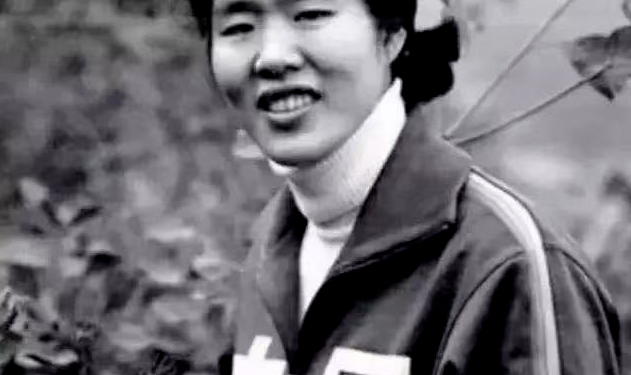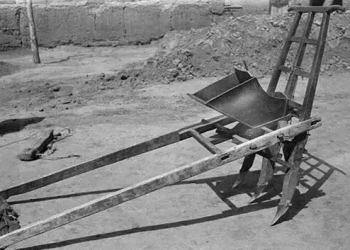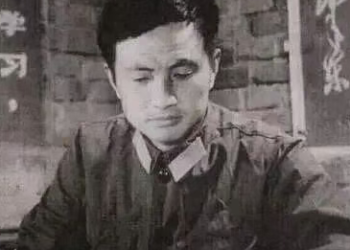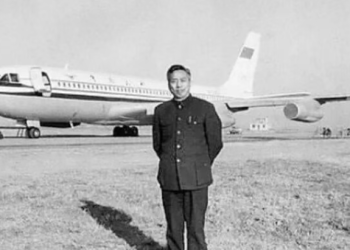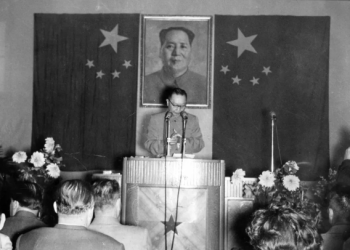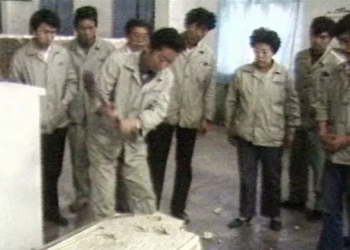On the evening of November 16, 1981, schools suspended classes, factories halted work, and the entire nation was fixated on one sporting event—the 3rd FIVB Women’s Volleyball World Cup.
At the same time, the match in Tokyo, Japan, was in full swing.
In the decisive set, the Chinese team faced off against the host team, Japan.
Lang Ping, playing as a key starter, was in top form. At match point, the moment she leapt into the air—
a report once described it this way:
“In the final second of her spike, the whole world fell silent.”
With a powerful smash, China triumphed over Japan with a score of 3–2—this was the historic and globally celebrated “Victory”.
News of the win spread across the country, and celebrations erupted nationwide.
In that era of scarcity, the women’s volleyball team’s victory greatly uplifted the national spirit and confidence.
That battle in Tokyo made Lang Ping a household name.
She was only 21 years old at the time.
But that didn’t stop the golden age of Chinese women’s volleyball from unfolding.
As a core player, she led the team to create a legendary record in world volleyball history: five consecutive world titles.
Lang Ping was born to play volleyball—standing 1.84 meters tall, with exceptional vertical reach, a spike reach of 3.17 meters, a dynamic and versatile quick-attack technique, and formidable strength backed by relentless hard work.
Thanks to her precise and fierce spikes, she became famously known as “The Iron Hammer.”
In just five years, she earned nearly every possible honor in the sport of volleyball.
Behind the glory and accolades, however, years of intense training left her with lasting injuries.
In 1986, she was forced to retire.After retiring, Lang Ping accepted an invitation to join the Beijing Sports Commission.
One day, a director from a training base invited her to accompany him to the State Economic Commission.
Only after arriving did she realize they were there to request funding from the state—funds intended for building a training facility.
As a newcomer assigned to the task by leadership, Lang Ping naturally spoke in support of the proposal.
The money was quickly approved, but it wasn’t immediately used for the base’s construction. Someone reported the misuse.
The leadership shifted the blame onto Lang Ping, and she was harshly criticized by the Sports Commission:
“Lang Ping, you need to be modest and cautious. Just because you won a world championship doesn’t mean you can act like you own the place!”
Lang Ping felt deeply wronged and furious.
After this incident, she made a firm decision to leave:
“I don’t want to be this kind of official. I’m not cut out to be one.”
Since she didn’t want to be an official, and didn’t want to live off her past glory, what could she do?
After much thought, she decided to learn something truly practical—
She chose to study sports management in the United States at her own expense.
When she first arrived in America, she had only $90 in her pocket.
To cover living expenses, she had to work as a coach at ten different summer camps.
To save money, she made and ate homemade sandwiches every day of the week.
To afford the expensive tuition, she flew to Italy to play in matches—
She played until the cartilage in her knees shattered, fluid built up around them, and she had to take painkillers before every game.
“There was no choice. Once you take someone else’s money, you have to play your heart out for them.”
After earning her graduate degree, Lang Ping was appointed head coach of the University of New Mexico women’s volleyball team, and finally, she and her husband gained a firm foothold in the United States.
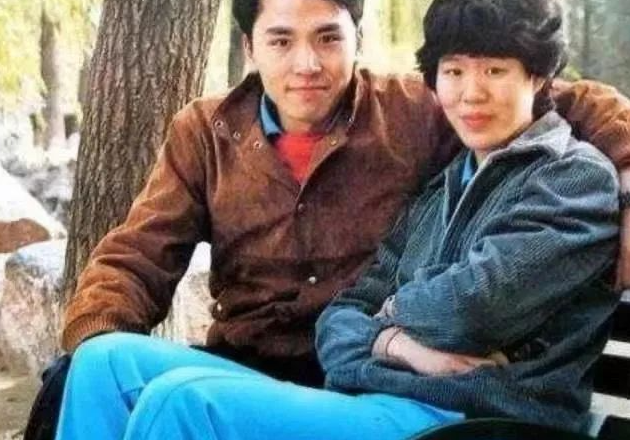
When Lang Ping became the head coach of the U.S. women’s volleyball team, she entered a completely different environment.Liang Mai recalled:
“The U.S. training center is located in Colorado. One time, Lang Ping took us out for a meal and we even ran into Kobe Bryant. They high-fived and greeted each other. I asked Lang Ping, ‘Has the U.S. team lineup been finalized?’ She said no.
I joked, ‘Do you think I’m here to spy on military secrets?’
Lang Ping laughed and replied, ‘Definitely not. The U.S. women’s volleyball players are all scattered playing in different leagues. I have to call each of them individually to ask if they’ll participate in the Beijing Olympics.
The U.S. women’s volleyball team doesn’t have that same sense of duty and patriotism as China’s team. There’s no “honor the motherland” mindset—it’s all based on voluntary participation.’”For any professional coach, working with teams from different countries is a valuable experience and a form of wealth.Li Tieming, who once served as Lang Ping’s assistant coach on both the U.S. national team and the Evergrande team, shared a similar journey. After retiring from the Chinese men’s national team, he went to play in the German league, pursued a master’s degree in volleyball coaching in Japan, and later joined the U.S. national team’s coaching staff.
Li Tieming explained,
“We all started in provincial teams, moved up to the national team, then retired back to our provinces and became coaches. It’s like masters teaching apprentices—the same circle of coaches and athletes.
At the time, the idea of going abroad was simple: we wanted to learn from the outside world, to see how other countries trained and what their philosophies were.
You can’t separate a sport from the culture and social system of the country it’s in.
Europe, the U.S., Japan, and China all have different volleyball cultures, each with their own strengths. I study your strengths, and when we compete, I want to see which of us can overcome the other.
Doing research or going on observation tours is one thing—but coaching, like Lang Ping did, is something entirely different.
Observers are bystanders; Lang Ping became a participant and even a leader in that volleyball culture. Her experience is deeper and her voice carries more weight.”
When coaching a professional club in a league, the situation is very different: the lineup changes every season, and sometimes new players are added mid-season. For the head coach, the most important task is team coordination—forming the optimal lineup to bring out the team’s best performance.Li Tieming added:
“The U.S. national team faces a similar challenge. They have a very wide talent base with many athletes to choose from. It all depends on how the head coach selects and combines the players.Now that Lang Ping is back coaching the Chinese women’s national team, she’s introduced the idea of a ‘big national team’ system.She’s drawing from these overseas coaching experiences to take the club league’s disadvantages and turn them into strengths—using it to build a strong national team structure.”
Even at the national team level, the cultural differences between the U.S. and China are vast.
Li Tieming explained:
“In the U.S., players pay for their own volleyball training from a young age. It’s a personal choice to walk this path—there’s no need for ideological mobilization.
The U.S. has no national league system; most of their players are professionals playing abroad. They manage their own schedules, take care of themselves, and are highly self-motivated.
They’re not subject to the same kind of centralized management seen in China’s national teams.One year before the World Cup, the U.S. team was about to depart when a key player suddenly decided she didn’t want to go.
Later we found out it was due to emotional issues.
Something like this would never happen in China.”While coaching the U.S. team, Lang Ping’s primary task was to maximize their strengths and cover their weaknesses.
She invited Li Tieming to join her coaching team because of his five years of study and coaching experience in Japan.
Li said:
“American players are tall, physically strong, and powerful at the net. Their offense is aggressive. But their footwork is weak, and they often make unforced errors.
Japanese teams are known for their ground techniques—defense, receiving, small-ball coordination, and attention to fine details. They’re tough to beat and tenacious—qualities that directly counter the U.S. team’s weaknesses.”
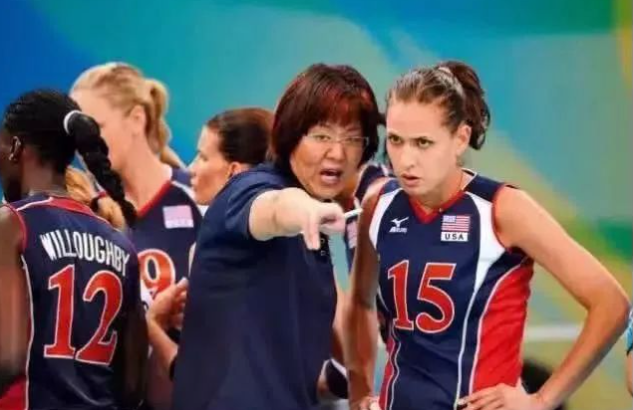
With her experience playing in the Italian league and studying and coaching in the United States, Lang Ping’s coaching style had an international edge, making her one of the most sought-after women’s volleyball coaches of the time.
In 1991, Lang Ping led the University of New Mexico women’s volleyball team to win the Eastern Regional Championship in the U.S.
In 1993, she was invited by the Yaohan All-Star team in Japan to serve as head coach.At the same time, China’s national women’s volleyball team had long lost its former glory.
The team was suffering repeated defeats, and the players were deeply demoralized.Just when everyone was at their wits’ end, the national sports committee leadership thought of one name—Lang Ping.|
But would Lang Ping say yes?
First, there was the huge salary gap.
At that time, Lang Ping was earning an annual salary of $200,000 USD coaching in Japan. If she returned to China, she would be paid only 500 RMB per month.Second, there was a massive compensation fee.
Terminating her contract would mean hundreds of thousands of dollars in penalties—an amount Lang Ping simply couldn’t afford.Lang Ping found it hard to believe that the Chinese women’s volleyball team had fallen so far behind.
But when the sports committee official said those words:“Lang Ping, your country truly needs you.”
She could no longer turn a blind eye.Right then and there, she made the decision:
No matter what it takes, she would return to China and revive the spirit of the women’s volleyball team.
 After returning to China, Lang Ping boldly reformed and rebuilt the team.Being a coach was no easier than being a player—it was even more demanding.She was responsible not only for the team’s overall training goals, but also for scrutinizing every single strategy.
After returning to China, Lang Ping boldly reformed and rebuilt the team.Being a coach was no easier than being a player—it was even more demanding.She was responsible not only for the team’s overall training goals, but also for scrutinizing every single strategy.
At the same time, Lang Ping realized that the biggest issue facing the team was a lack of confidence.
She personally talked to each player, identified their greatest strengths, and repeatedly encouraged them:
“You can do it.”Lang Ping’s coaching abilities soon paid off.In 1995, China won bronze at the FIVB World Cup.In 1996, they secured the silver medal at the Atlanta Olympic Games.In 1997, they became Asian Women’s Championship winners.In 1998, they claimed the Asian Games volleyball gold medal.
Turning a team from its lowest point back to the top—there are very few coaches who can achieve that.
There is only one Lang Ping.Lang Ping once said, she had two daughters: one is Bai Lang, the other is the Chinese women’s volleyball team.
To her family, she owed too much, far too much.
When she decided to return to China, her daughter was only two years old.
Before that, cracks had already formed in her marriage to Bai Fan, and when she returned to China, she brought with her not just luggage—but also a divorce certificate.
Knowing the immense responsibility that came with being the head coach of the national team, she left her daughter in her ex-husband’s care.
When her daughter missed her, she would cry and call her long-distance.
But with only a 500-yuan monthly salary, Lang Ping couldn’t even afford the phone bill.
Once, her daughter had a high fever during a call—Lang Ping could do nothing but cry in frustration.Now that the national team had regained strength, it was her daughter Bai Lang who needed her more.In 1999, Lang Ping resigned and stepped down from the Chinese women’s volleyball team.
But after 2009, the team once again fell into a slump.
Cries of disappointment echoed through the courts.In the 2012 World Grand Prix Finals, China exited with only one win and four losses.In the London 2012 Olympics, they were unexpectedly knocked out by Japan—a team they had never lost to before.In the third Asian Women’s Volleyball Cup, China suffered a shocking defeat to Thailand.The decline of the women’s volleyball team deeply concerned the sports authorities.
Having no other solution, all eyes once again turned to Lang Ping.
By then, Lang Ping’s coaching value had skyrocketed.
Everyone knew—whoever could get Lang Ping would have a shot at the championship.
Still, the sports committee wanted to try.For Lang Ping, there was one sentence she could never refuse:“Your country needs you.”
Once again, the committee reached out to Lang Ping:”You are Chinese by birth, with a patriotic heart. Even if you’ve spent ten years in silence, your blood still runs hot.”In 2013, at the age of 53, Lang Ping returned once more to coach the Chinese women’s volleyball team.
In the competitions that followed, she led the team to win:The 2015 Asian Championship,The 2016 Rio Olympics gold medalThe 2019 Women’s Volleyball World Cup.“Raise the national flag, play the national anthem”—the promises of the Chinese women’s volleyball team were all fulfilled.That year, the team appeared atop a float during China’s 70th National Day Celebration Parade, carrying with them honor and glory—a proud tribute to their motherland.

In an episode of A Date with Luyu, Lang Ping’s father was once interviewed.
With a trembling voice, the elderly gentleman choked up as he described his daughter:
“Her entire life has been devoted to women’s volleyball.”
To this day, Lang Ping has become the very embodiment of the “women’s volleyball spirit.”
Her perseverance, dedication, and passion have long become the core essence of that spirit—
nurturing and inspiring generations to come.
